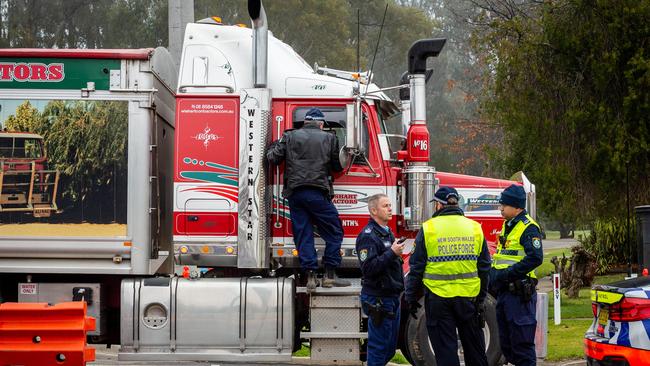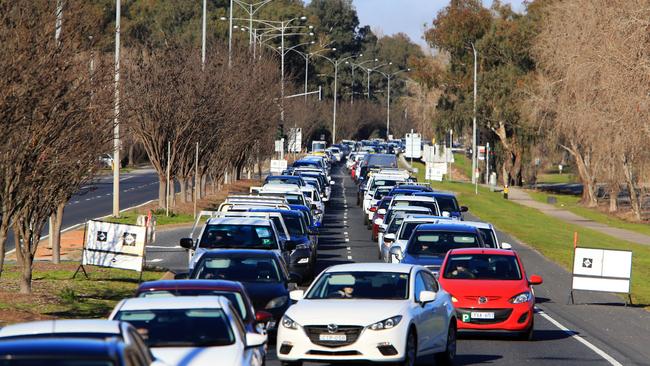Confusion at NSW-Victoria border as truck drivers told to self-isolate
Traffic and a messy permit process have resulted in long delays for truck drivers trying to cross the NSW-Victoria border, with some told they need to isolate.

Truck drivers entering NSW from Victoria have been told to self-isolate for at least 14 days, despite being exempt from the travel restrictions.
Chaos has descended on the main border crossing between the states. Truck drivers have struggled to access the online forms for entry permits, while those who have the right document are facing delays of up to 90 minutes to cross from Wodonga to Albury.
The Transport Workers Union said some truck drivers were avoiding travelling from Victoria to NSW on Wednesday after Service NSW told them when they applied for an exemption they would have to self-isolate for 14 days.
Service NSW has issued several types of permit allowing people entry from Victoria. A Type A permit requires 14 days self-isolation upon entry into NSW, while a Type C permit allows travel as normal.
A NSW government spokeswoman said: “There is absolutely no requirement for truck drivers carrying freight to self-isolate for 14 days, as long as they have a permit”.
But Victorian Transport Association chief executive Peter Anderson said most truck drivers had not been able to obtain the correct Type C permit. Instead they have been given the Type A permit, which stipulates they must self isolate for 14 days upon entry into NSW from Victoria.
“You can’t get a class C permit. I’ve been trying all morning to get one. You can get a class A but a class C, which is for critical services,” Mr Anderson said.
“We’ve got the class A that we can wave out the window to show police if we’re stopped but it isn’t the correct one.”
Meanwhile truck drivers who attempted to travel on the main border crossing between Wodonga and Albury faced queues stretching up to four kilometres on Wednesday.
Long delays
The delays came after traffic travelled relatively smoothly along the Hume Highway at Albury on Tuesday night. But Mr Anderson said that changed at 6.30am on Wednesday when NSW Police reduced traffic to one lane, causing the bumper-to-bumper queues.
“They had two lanes going through last night, a truck lane and a car lane at Albury, which is the major route carrying about 3000 heavy vehicles a night and about 5000 a day.
“They had it working well last night at that crossing. However, at 6.30am this morning they took it down to one lane and took it across the causeway. That meant the queue was about 3-4km long and took an hour and a half to get through.”
Mr Anderson said the gridlock not only hurt local residents in Albury and Wodonga, but delayed freight, with truck drivers struggling to meet their daylight schedules.
A NSW Police spokeswoman said truck drivers were exempt from the border closures, following reports that some had been issued isolation notices from Service NSW.
When asked about these notices, which allow truck drivers to enter NSW from Victoria if they self isolate for 14 days upon entry, a Service NSW spokesman referred The Australian’s question to Health NSW, which then referred the matter to NSW Police.
“In terms of heavy vehicles, we are trying to get through as smoothly as we can and we are getting an inconsistency of process,” Mr Anderson said.

“There are some smaller crossings that have just got a sign up, so people are just moving the signs and driving across. Other ones, such as at Corowa, people have been turned around three or four times because they can’t get the right permit.”
Logistics giant Toll has about 100 trucks crossing the Victoria-NSW border each day and is concerned the border restrictions will delay the delivery of essentials items such as food and medical supplies.
“As an essential service, transport and logistics is critical in delivering medical supplies, food and other important goods to communities. With close to 100 Toll trucks crossing the Victoria-NSW border daily, we are concerned that any delays risk disrupting supply chains including the delivery of essential items to our communities,” A Toll spokeswoman said.
“We encourage the New South Wales Government to exempt transport and logistics workers in line with the approach applied by the Queensland Government.”
NSW Premier Gladys Berejiklian said “special conditions will be in place for freight operations and other critical services” when she announced the border closure on Monday.
“As I have said before, it is in our national interest for borders to be open,” Ms Berejiklian said.
“The people of NSW have done an incredible job to help stop the spread of COVID-19, allowing us to open up our economy. The outbreak of cases we are seeing in Victoria is putting these gains at risk.
“I do not take this step lightly, but have always said we will do what we must to protect the health and jobs of NSW residents.”




To join the conversation, please log in. Don't have an account? Register
Join the conversation, you are commenting as Logout